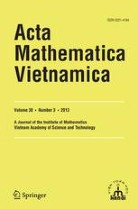
Acta Mathematica Vietnamica
- Volume 50
- Volume 49
- Volume 48
- Volume 47
- Volume 46
- Volume 45
- Volume 44
- Volume 43
- Volume 42
- Volume 41
- Volume 40
- Volume 39
- Volume 38
- Volume 37
- Volume 36
- Volume 35
- Volume 34
- Volume 33
- Volume 32
- Volume 31
- Volume 30
- Volume 29
- Volume 28
- Volume 27
- Volume 26
- Volume 25
- Volume 24
- Volume 23
- Volume 22
- Volume 21
- Volume 20
- Volume 19
- Volume 18
- Volume 17
- Volume 16
- Volume 15
- Volume 14
- Volume 13
- Volume 12
- Volume 11
- Volume 10
- Volume 9
- Volume 8
- Volume 7
- Volume 6
- Volume 5
- Volume 4
- Volume 3
- Volume 2
- Volume 1
METHODS FOR FINDING GLOBAL OPTIMAL SOLUTIONS TO LINEAR PROGRAMS WITH EQUILIBRIUM CONSTRAINTS
LE DUNG MUU, NGUYEN VAN QUY
Abstract
A mathematical program with equilibrium constraints is an optimization problem with two sets of variables $x$ and $y$, in which some or all of its constraints are defined by a parametric variational inequality or complementarity system with $y$ as its primary variables and $x$ the parameter vector. This problem even in the linear case is a difficult global optimization problem because of its nested structure. We use a dual formulation of this problem to develop two decomposition branch-and-bound algorithms for finding a global optimal solution of a linear mathematical program with equilibrium constraints. The first algorithm uses a simplicial subdivision whereas the second one uses a binary tree defined by using the sign (zero or positive) of the dual variables. The searching trees in both lgorithms are created in the dual space. Preliminary computational experiences and results show that on a PC computer the lgorithm using binary tree can solve linear problems with equilibrium constraints up to twenty-five dual variables; the number of the primal variables may be larger.


